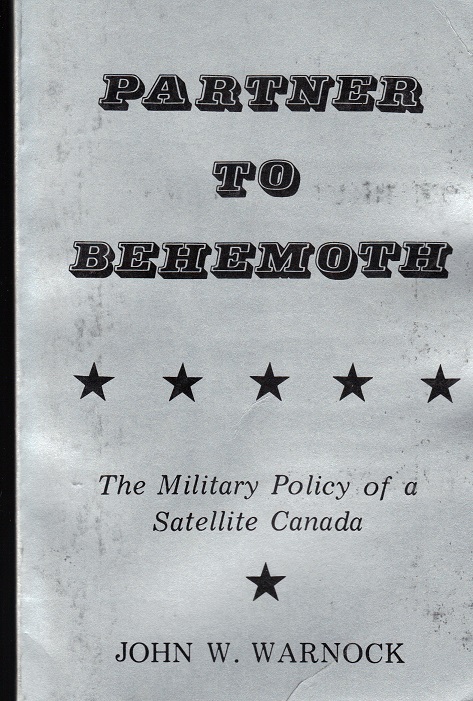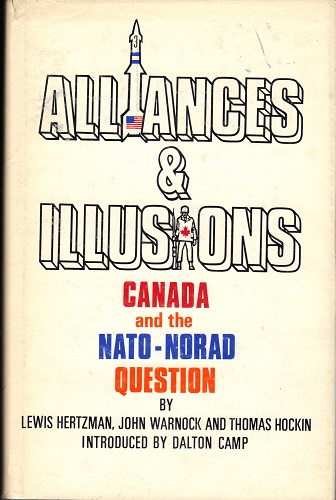Canada and NATO | How the Cold War Has Transformed Canada into a Virtual Satellite of the USA
From the beginning around 1947, Canadian governments were enthusiastic in their support of the U.S. government and its determination to create a military alliance system to “contain” the supposed aggressive and expansionary Soviet Union. This included the formation of the North Atlantic Treaty Organization and the North American Aerospace Defence Command. The two North American countries took major steps to integrate the industries which manufactured military equipment, including the Canada-U.S. Defence Sharing Agreement.
For the United States, the key country within the military and political alliance has always been Great Britain. The two countries worked together to develop nuclear weapons. When it came to chemical and biological weapons, the alliance expanded to include Canada, Australia and New Zealand. This Group of Five also shares top secret intelligence and security information. Many know this agreement as Echelon, which is identified with spying through the Internet system. The popular name for this intelligence operation is the “Five Eyes.” It could be said that these five countries represent the Anglo-American alliance to dominate the world.
Partner to Behemoth. The Military Policy of a Satellite Canada.
by John W. Warnock
Toronto and Chicago: New Press, 1970.
CONTENTS
Preface
1. Canada and the Cold War 1
2. Was NATO Necessary? 28
3. The Impact of the Korea War on NATO 57
4. Decision-making in NATO 76.
5. Canadian-American Defence Co-operation 104
6. The Rationale for Defence Co-operation 135
7. Canada and the Cuban Missile Crisis 156
8. The Debate over Nuclear Weapons 183
9. The Introduction of the Anti-ballistic Missile 202
10. Problems Raised by the Armaments Industry 228
11. Canada’s Role in Inter-National Peacekeeping 269
12. Conclusion 296
Appendix 319
Bibliography 329
Index 337
Canadian Reader, Volume 12, No. 2, February 1971.
Review by Gary Teeple.
"John Warnock’s thesis is simple: decisions made about Canada’s military role in foreign affairs are too often based on the best interests of the United States and not on the best interests of Canada.
Warnock builds upon the revisionist theory of the origin of the Cold War which identifies the major causative factor as the desire to keep Europe safe for capitalism. NATO, which has been the “cornerstone” of Canadian policy, should be seen, according to Warnock, not as a defence against an external threat from the Soviet Union, but as a defence against the possibility of an internal socialist or communist victory. The NATO alliance is transformed, because of the tremendous power differential between America and her allies, into an American satellite system operating to preserve an American sphere of influence.
For Canada, the consequence of such a development are profound. Because of her geographic proximity, her World War II defence ties, and her elites’ acceptance of the need for a crusade against Communism, satellite Canada has her military and foreign policies integrated with those of the United States. Warnock shows that the cost of this integration to Canada’s sovereignty and international prestige has been high....
Warnock’s book presents a controversial argument but he is not open to a charge of emotionalism. The documentation is very thorough and the style is academic. Thus it seems likely that Partner to Behemoth will become a standard reference work in the developing debate over the future of Canada and Canadian nationalism."
Alliances and Illusions: Canada and the NATO-NORAD Question
by Lewis Hertzman, John Warnock and Thomas Hockin.
Introduction by Dalton Camp
Edmonton: Hurtig Publishers, 1970.
Canadian Journal of Political Science, Vol. 4, No. 4, 1971 December, pp. 575 - 588.
Review by Graham Murray.
"The contributors to this book (and Dalton Camp’s long characteristically forthright, introduction) reflect the widespread frustration in the academic community and beyond it at the confused and shallow debate, and pseudo-participatory character, of the [official government] foreign policy review. All three authors express dissatisfaction with the procedure of the review process as well as scepticism concerning its outcome. They are also generally in agreement on matters of substance - being critical of particular features of prevailing foreign and defence policy, expressing discontent over its overall contribution to the attainment of national ends, internal and external, and urging that its direction and priorities be fundamentally changed . . .
On the military and political relationship with the United States the contributors are agreed in rejecting the claim that quiet diplomacy has secured for Canada a rewarding “special partnership.” Warnock, in particular, details Canada’s subservience within NORAD and convincingly depicts the constraints of quiet diplomacy as self-denying ordinances which are operative in Ottawa but not in Washington. Accordingly, he is critical of deference to Ameriican wishes on continental defence, up to and including the ambiguities of the Trudeau government on the Anti-Ballistic Missile question.
On the record, this judgement is difficult to fault, but a more assertive policy could hardly have liberated Canada from the fact of her relative weakness - for, as Warnock himself states: “Influence in a military alliance is exerted roughly in proportion to the power of the nation-state, and as far as the United States is concerned, Canada is a small, minor power.”
Warnock thus mounts a twofold attack on orthodox policy, condemning the habit of accommodation to American purposes while arguing that not even the most strenuous Canadian efforts within the alliance would have sufficed to deflect those purposes. The necessary implication is that Canada must repudiate the American connection, which has made the country “a client state. . . the NATO equivalent of East Germany” – though one looks in vain for any admission by Warnock that such servitude is difficult to shed. Less extreme but equally in need of demonstration is his assertion that the integration of continental defence has in and of itself powerfully conduced to the erosion of the country’s economic and cultural, and not just political, independence."
 I continue to put out new articles and material that you can find on my blog at blogspot.
I continue to put out new articles and material that you can find on my blog at blogspot.


